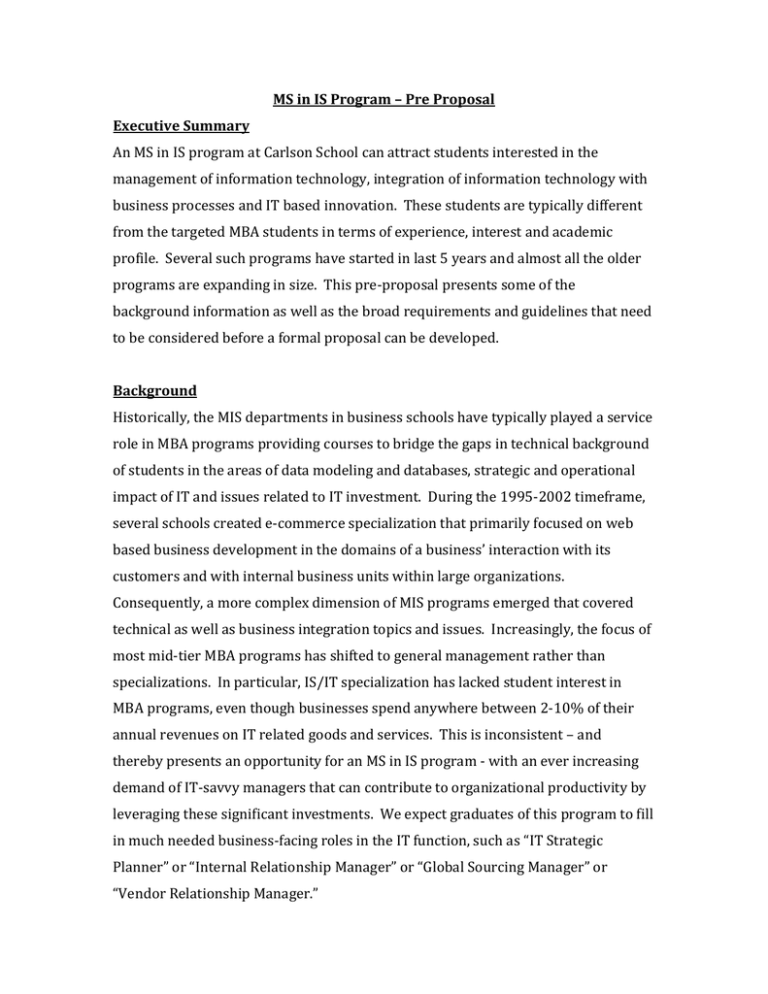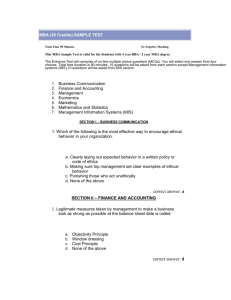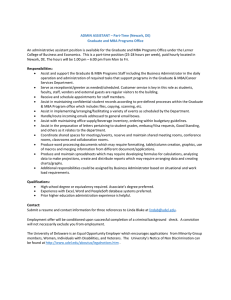MS in IS Program – Pre Proposal Executive Summary An MS in IS program at Carlson School can attract students interested in the management of information technology, integration of information technology with
advertisement

MS in IS Program – Pre Proposal Executive Summary An MS in IS program at Carlson School can attract students interested in the management of information technology, integration of information technology with business processes and IT based innovation. These students are typically different from the targeted MBA students in terms of experience, interest and academic profile. Several such programs have started in last 5 years and almost all the older programs are expanding in size. This pre‐proposal presents some of the background information as well as the broad requirements and guidelines that need to be considered before a formal proposal can be developed. Background Historically, the MIS departments in business schools have typically played a service role in MBA programs providing courses to bridge the gaps in technical background of students in the areas of data modeling and databases, strategic and operational impact of IT and issues related to IT investment. During the 1995‐2002 timeframe, several schools created e‐commerce specialization that primarily focused on web based business development in the domains of a business’ interaction with its customers and with internal business units within large organizations. Consequently, a more complex dimension of MIS programs emerged that covered technical as well as business integration topics and issues. Increasingly, the focus of most mid‐tier MBA programs has shifted to general management rather than specializations. In particular, IS/IT specialization has lacked student interest in MBA programs, even though businesses spend anywhere between 2‐10% of their annual revenues on IT related goods and services. This is inconsistent – and thereby presents an opportunity for an MS in IS program ‐ with an ever increasing demand of IT‐savvy managers that can contribute to organizational productivity by leveraging these significant investments. We expect graduates of this program to fill in much needed business‐facing roles in the IT function, such as “IT Strategic Planner” or “Internal Relationship Manager” or “Global Sourcing Manager” or “Vendor Relationship Manager.” Due to the demand and a lack of interest by MBA students in MIS specializations, in the last decade a significant number of business schools have started offering MS in IS degree. Except for a small number of exceptions, every school that has a significant presence in the MIS domain (5+ tenure track faculty) offers an MS in IS degree. A representative list includes: 1. Carnegie Mellon University 2. University of Michigan 3. University of Virginia 4. University of Arizona 5. Indiana University 6. University of Washington 7. Georgia State University 8. Arizona State University 9. Boston University 10. University of Utah The notable exceptions are: 1. University of Texas at Austin 2. University of Maryland 3. University of Minnesota 4. University of Connecticut In the past, Carlson School of management has been reluctant to entertain the idea of a MS in IS program due to potential conflicts with the MBA program. However, a discussion with 5 of the 10 programs listed above has resulted in the realization that the students attracted to MS in IS differ in their profile and career goals. The notable differences from typical MBA students are: 1) All the students in these programs have a technology based undergraduate degree as opposed to 25‐30% of MBA students. Further, most of these students have interest in technology related careers. 2) MS in IS students typically do not have substantial work experience and many schools target their undergraduate students for MS in IS degree. 3) A substantial number of students are foreign students. The increasing globalization of IT has created a tremendous shortage of middle level IT professionals in countries such as India. There is a demand for globally capable IT managers that can exploit knowledge of local customers and business processes garnered through a reputable US based MS in IS program. Therefore, the students in MS in IS should not pose any conflicts with MBA students at Carlson. Academic Structure of MS in IS Programs Most of the MS in IS programs focus on building advanced capabilities in one or more of technological areas along with fundamental education in finance and accounting. In addition, some programs allow up to 1/3rd of the credits (ranging from 30 – 36) in general business topics including strategy, marketing and operations. The business requirements are sometimes waived for students with undergraduate degrees in MIS or other business areas. The typical programs last for 12 to 18 months with a significant project/internship components. A typical plan of study looks like the following: Business Education Requirements: 9‐12 credits of: Finance Accounting Operations/Supply Chain Marketing Strategy Core IT Requirements: 9‐12 credits of technical courses: Advanced Programming Advanced Databases Data Warehousing Data Mining Information Security Concentration Courses Multiple courses in one of the following areas: IT Security Management IT Governance Enterprise Systems IT based Innovation Outsourcing and Project Management Data Mining and Business Inteliigence Proposed Program (Current Thought) A key benefit of proposed program is that while courses in MBA programs rarely provide opportunity to leverage faculty research in coursework, an MS program can provide an avenue for faculty to teach courses in areas related to their research and create a channel for research to benefit practice and vice‐versa. We plan to propose a program that follows the aforementioned structure with the focus on courses that can provide concentration courses in 3 possible areas: Enterprise Systems IT based Innovation Global Sourcing of IT and IT enabled Services We plan to explore partnerships with leading institutions and IT service providers in India to deliver a joint degree with focus on global sourcing. We will leverage our courses in the MBA program; however, we will develop 20 credits worth of new courses to support the concentrations. University Requirements for a New Graduate Degree Program In the past graduate school approved each new degree program. Besides the intellectual rigor and research base, the primary criteria for any program were its commercial viability and a demonstrated need in the market space for the students graduated from the program. However, the budget crisis has resulted in dissolution of graduate school and the guidelines for approval of graduate programs are somewhat unclear. Most likely, the responsibility will be shifted to schools themselves (e.g., Carlson School will be responsible for its masters programs). Regardless of the governance of the program and its approval, the critical factor is the job prospects of the students. Most programs (e.g., Indiana and Arizona) have expanded their program sizes from 40‐50 to 100+ in last two years. The student demand seem to be strong as well. Questions/Issues for Discussion 1) Other information/specifics that EABC might want to be informed about. 2) Are the market conditions observed at other schools applicable in Twin Cities? Will there be demand for MS in IS graduates? 3) Are the focus areas appropriate for this market? 4) Minimum cohort size to attract reasonable number of employers. 5) Internships model, embedded projects, IT enterprise.



